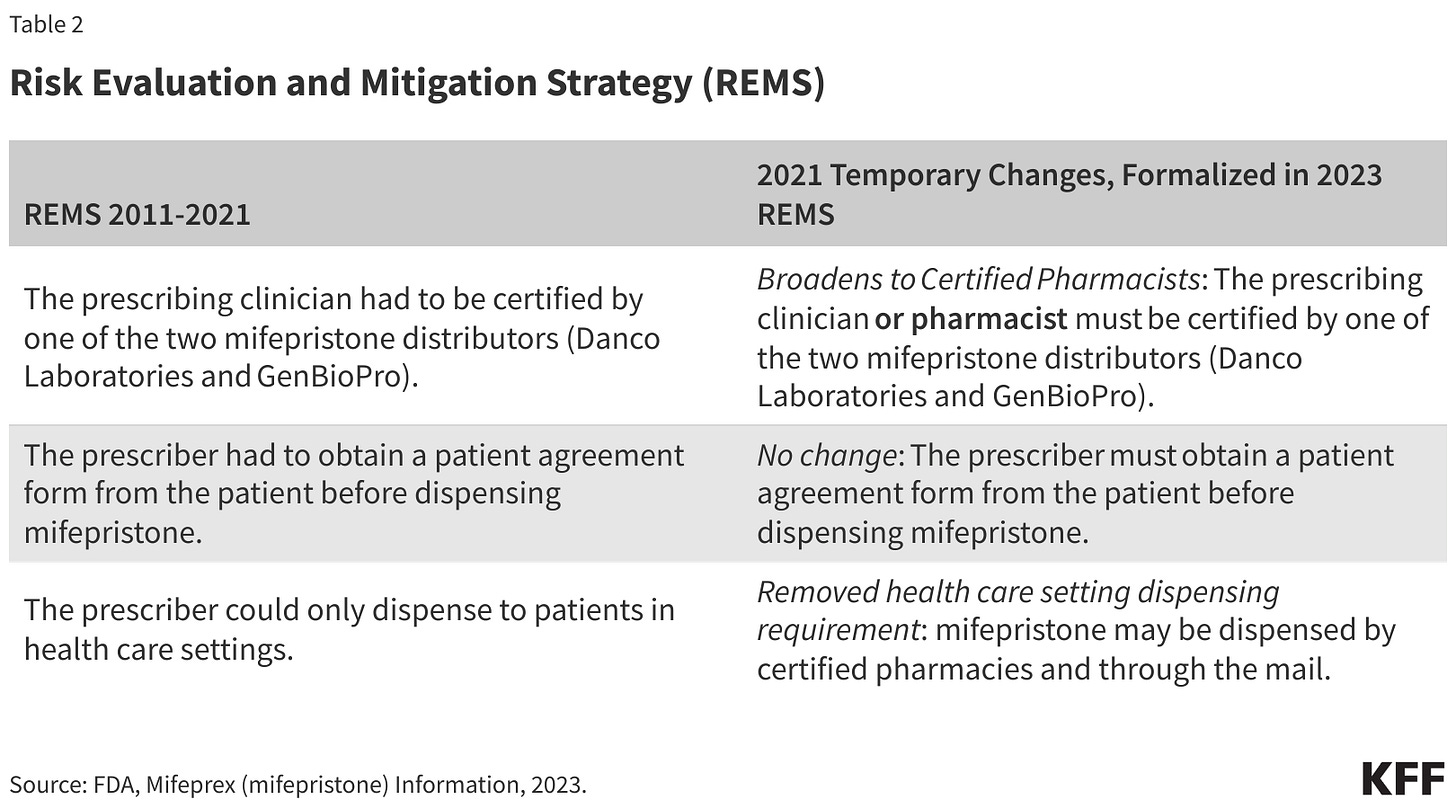Anti-choicers are going after a blood sugar medication
Yes, really.
Anti-choicers are ruthless. They won't let anything or anyone stand in their way of keeping as many people unwillingly pregnant as possible. And because they continue to be some of the most selfish people on the planet, the list of people who have become victims of the anti-choice movement keeps getting longer. And longer. And longer.
Now, the antis have set their sights on restricting access to blood sugar medication.
Yes, really.
Antis are desperate to keep abortion medications away from pregnant people. Of the medications used to terminate pregnancy, they have made mifepristone (the first drug of a two-drug regimen for medication abortion) their first target. Antis love to claim mifepristone is dangerous, and yet, just last year, they argued in front of the Supreme Court of the United States that patients should be required to take triple the current dose, all because they wanted to turn back the clock on mifepristone regulations to before 2016.
As you will recall from rePro-Truth's coverage of Alliance for Hippocratic Medicine v. FDA, mifepristone has multiple medical uses, including to control high blood sugar in patients with Cushing Syndrome. As rePro-Truth previously explained:
…because mifepristone is a glucocorticoid receptor antagonist, it is used to “control hyperglycemia secondary to hypercortisolism in patients with endogenous hypercortisolism (Cushing syndrome) who have type 2 diabetes mellitus or glucose intolerance and have failed surgery or are not candidates for surgery.”1 “Cushing’s syndrome is a rare endocrine disease that causes elevated cortisol levels and can be life-threatening in certain cases.”2 In April 2023, the Endocrine Society released a statement warning that a “decision to overrule the FDA’s approval of mifepristone could restrict access to treatment for Cushing’s syndrome and has broader implications on drug approvals.”3
Mifeprex is the brand name of the mifepristone that is used in medication abortion.
Korlym is the brand name of the mifepristone that is used to treat Cushing Syndrome. And now the anti-choice movement has set its sights on Korlym.
Enter H. R. 5646.
Republican anti-choicer, U.S. Rep. Mary E. Miller (R-IL), has introduced H. R. 5646 (a.k.a. the “Restoring Safeguards for Dangerous Abortion Drugs Act”). The bill is being co-sponsored by Barry Moore (R-AL), Sheri Biggs (R-SC), Randy Weber (R-TX), Pat Harrigan (R-NC), Tim Burchett (R-TN), and Doug LaMalfa (R-CA).
Despite the bill being called the “Restoring Safeguards for Dangerous Abortion Drugs Act,” the bill targets mifepristone more broadly — not just mifepristone used in pregnancy termination. In fact, the bill specifically names Korlym.
At the beginning of the bill it states:
In this Act, the term ‘‘covered medication’’ means mifepristone, also known by the brand names, Mifeprex and Korlym, and the developmental code name, RU–486 (emphasis added).
The antis are clearly worried that doctors will prescribe Korlym off label if antis were ever to successfully ban mifepristone for abortion.
H. R. 5646 would place restrictions on mifepristone nationwide, effecting people in need of medication abortion and patients with Cushing Syndrome (as well as multiple others), though not necessarily to the same extent.
Specially, there are two sections of H. R. 5646 that, as written, appear to apply to Korlym.
Civil liability for harm (Section 3)
Bans on importation (Section 4)
Civil Liability (Section 3)
Section 3 of H. R. 5646 states, “A covered entity” - that is, “a telehealth provider, pharmacy, or any other person who knowingly imports or transports a covered medication in interstate or foreign commerce in violation of section 1462 of title 18, United States Code,” a.k.a. the Comstock Act) - “shall be liable in accordance with this section to any individual who suffers bodily injury or harm to mental health (including any physical, psychological, emotional, or physiological harm) that is attributable, in whole or in part, to the individual’s use of a covered medication [Mifeprex, Korlym] imported or transported.”
“An individual who who suffers bodily injury or harm to mental health that is attributable, in whole or in part,” from using mifepristone, can sue the “covered entities” listed in the above paragraph.
The Comstock Act's prohibitions related to abortion were unenforceable when Roe v. Wade was the law of the land. Ever since the Dobbs decision, antis have been trying to revivify the law to ban abortion nationwide. The Comstock Act prohibits importing, sending, or receiving:
“any drug, medicine, article, or thing designed, adapted, or intended for producing abortion, or for any indecent or immoral use; or any written or printed card, letter, circular, book, pamphlet, advertisement, or notice of any kind giving information, directly or indirectly, where, how, or of whom, or by what means any of such mentioned articles, matters, or things may be obtained or made.”
Since the language of the Comstock Act is so broad, “it could be used to not only ban medication abortion, but by prohibiting shipments of medical supplies used in clinics, it could outright ban abortion procedures in all 50 states. Yes, even [in states] with laws that protect abortion.”4 And because mifepristone is an abortion drug, Korlym can be “adapted or intended for producing abortion.” This means that the blood sugar medication can easily be swept up into Comstock’s prohibitions.
In fact, the civil liability section of H. R. 5646, which lumps in Korlym as a “covered medication,” is titled “FEDERAL TORT FOR HARM TO WOMEN CAUSED BY ABORTION DRUGS.” The title itself categorizes Korlym as an “abortion drug.”
Both civil liability and the revivification of the Comstock Act have major implications for people with Cushing Syndrome. The chilling effect upon shipping and receiving “abortion drugs” could cause such delays as to practically choke off the supply chain of a much needed, safe medication.
Ban on importation (Section 4)
Section 4 of H. R. 5646 categorically bans the importation of mifepristone into the United States. Section 4 states plainly that “no person may import the drug mifepristone into the United States, including by mailing such drug to individuals.” Combined with the potential chilling effect upon the domestic supply chain (as discussed above), blocking the importation of mifepristone could compound a supply shortage of mifepristone for the treatment of Cushing Syndrome to a devastating degree.
*Non-Korlym restrictions in H. R. 5646
*NOTE: Section 2 of H. R. 5646 appears to only apply to Mifeprex/mifepristone for medication abortion. There is no REMS for Korlym. Thus, to my understanding, Section 2 of the bill does not apply to Korlym.
Section 2 would require that the current REMS (Risk Evaluation and Mitigation Strategy) governing the dispensing of mifepristone for the two-drug medication abortion regimen be voided and returned to the 2011 REMS. (To better understand what REMS are and the history of REMS for mifepristone, see this KFF Health article.) The bill also prohibits a new REMS from being approved.
Returning to the 2011 REMS would eliminate telehealth, restricting patient access to medication abortion nationwide. The 2011 REMS required “in-person dispensing” at the doctor's office “by or under supervision of a certified physician.”5 It also required that misoprostol, the second drug used in the two-drug abortion regimen, had to be dispensed at the provider’s office or clinic, and it mandated a follow-up visit 14 days later.6 I other words, the 2011 REMS required medication abortion patients to visit the doctor's office three separate times: first, to receive mifepristone; second to receive misoprostol; third, a post-abortion follow-up.
Again, these restrictions would be reinstated nationwide.
Since the overturning of Roe v. Wade, we've seen the effects of anti-choicers’ complete incompetence when it comes to passing legislation that doesn't end up inflicting grotesque and barbaric harms. Whether the authors and sponsors of H. R. 5646 are too incompetent to foresee the clearly foreseeable problems that this bill would cause to those with Cushing Syndrome, or if, as is too often the case, they foresee the problems and just don't give a shit, this bill is a ridiculous attempt to keep people pregnant against their will at the expense of patients with Cushing Syndrome. It's just another example of a movement that will eagerly run over your grandmother if it means “winning.”
A few months ago, their target was USAID funding for impoverished moms and babies. Then it was PEPFAR, the U.S. program to address HIV/AIDS. Today, their target is a safe blood sugar medication. They'll keep finding new targets in their zero sum game. And they just don't care who gets hurt.■
Brown, D. R., East, H. E., Eilerman, B. S., Gordon, M. B., King, E. E., Knecht, L. A., Salke, B., Samson, S. L., Yuen, K. C. J., & Yau, H. (2020, October 29). Clinical management of patients with Cushing syndrome treated with mifepristone: Consensus recommendations. Clinical diabetes and endocrinology. https://www.ncbi.nlm.nih.gov/pmc/articles/PMC7596972/#:~:text=Mifepristone%20is%20a%20competitive%20GR,mellitus%20or%20glucose%20intolerance%20and
Endocrine Society. (2023, April 10). Endocrine society alarmed by Texas Court ruling banning mifepristone. https://www.endocrine.org/news-and-advocacy/news-room/2023/endocrine-society-alarmed-by-texas-court-ruling-banning-mifepristone
Endocrine Society. (2023, April 10). Endocrine society alarmed by Texas Court ruling banning mifepristone. https://www.endocrine.org/news-and-advocacy/news-room/2023/endocrine-society-alarmed-by-texas-court-ruling-banning-mifepristone
Rinkunas, S. (2024, February 29). 145 GOP members of Congress ASK Supreme Court to slash access to the abortion pill. Jezebel. https://www.jezebel.com/145-gop-members-of-congress-ask-supreme-court-to-slash-access-to-the-abortion-pill
Salganicoff, A., Sobel, L., & Felix, M. (2023, March 14). Legal challenges to the FDA approval of medication abortion pills. KFF. https://www.kff.org/womens-health-policy/issue-brief/legal-challenges-to-the-fda-approval-of-medication-abortion-pills/
Salganicoff, A., Sobel, L., & Felix, M. (2023, March 14). Legal challenges to the FDA approval of medication abortion pills. KFF. https://www.kff.org/womens-health-policy/issue-brief/legal-challenges-to-the-fda-approval-of-medication-abortion-pills/




Not surprised at all by these deranged Christian fundamentalist nationalists. I hope the Endocrine society goes after them and hits them heavily in the pocket book with a lawsuit. Federal judges have so far been able to put the brakes on some of these unlawful tactics used by the felon Trump’s regime.
The mifepristone used to treat Cushing’s is taken in much higher doses than a single dose used to treat a miscarriage or for an abortion. If Mifepristone is removed from the market the only way a Cushing’s patient could obtain it is possibly through an endocrinologist only. Which means it would be tightly regulated. On the other hand if Mifepristone is forced off the market then so can other drugs.
That’s why we have Bobby Kennedy and Donald Trump making pseudoscientific statements about vaccines, Tylenol for pregnant people and infants and toddlers false correlation with autism.
Only solution I see is to make the Felon Trumpty Dumpty a lame duck and vote blue.
PS: It’s disgusting to see Tim Burchett R-TN and Barry Moore R-AL support this bullshit legislation.
No Kings Day 2.0 Protests
October 18th. Call or email your Representatives let them know you hate what they are supporting. They are all so cowardly that Rep Moore was shouted down at his last Town Hall and left through the back door.
Mifepristone is so much safer than many other medications that we hear nothing about banning. It's also safer than the entire unregulated supplement market since you never know what you're getting in those pills from GNC.